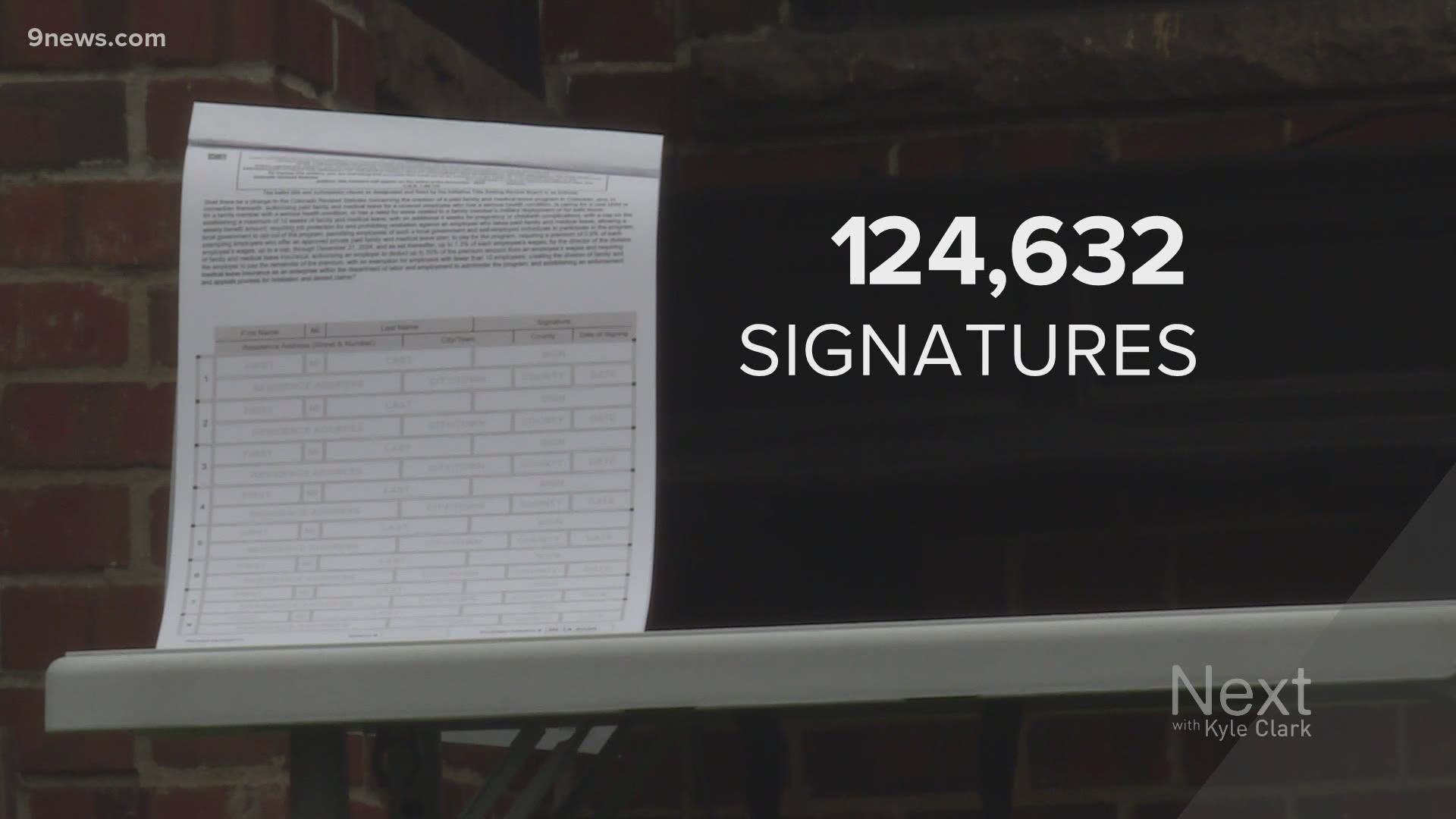DENVER — A signature piece of legislation pushed by Democratic lawmakers will now need signatures to become a reality.
Democratic lawmakers touted a paid family and medical leave bill as one of their signature pieces of legislation at the State Capitol. A proposal that was supposed to be introduced in February, fell apart when two of the Democratic sponsors pulled their names and support.
Paid family and medical leave would allow someone to get partial pay for leaving work for family or medical reasons, like having a baby, paternal leave or helping a family member recover from COVID-19.
Now, the remaining sponsors have decided to end their effort to pass a bill at the legislature and will support efforts to put the issue on the November ballot, which will require collecting more than 124,000 valid voter signatures during a pandemic.
"In this crisis, our negotiating partners, the folks we were working with in the business community have stopped negotiating with us," said Rep. Matt Gray, (D-Broomfield). "They don't think this is the time for paid family and medical leave because there's too much crisis, whereas we think a pandemic shows exactly why we need paid family and medical leave right now."
"When your negotiating partners leave the table; it's been too long, enough is enough," said Sen. Faith Winter, (D-Westminster).
Winter and Gray had to delay the introduction of the paid family and medical leave bill earlier this year when Sen. Angela Williams (D-Denver) and Rep. Monica Duran (D-Wheat Ridge), pulled their support.
"All of our stakeholders walked away from this process and this something that needs to happen now more than ever," said Rep. Yadira Caraveo (D-Thornton), a pediatrician when not at the Capitol.
When she pulled her support in February, Williams told Next with Kyle Clark, "This bill in its current form does not deliver a benefit to the vast majority who tend to work in low-wage jobs that often lack stability."
"What the coronavirus has done is really shined a mirror on our society on how we aren't protecting the lowest income workers. We aren't protecting communities of color. We aren't protecting part-time workers, and I refuse to pass something that leaves people out," said Winter on Thursday.
"From the beginning of this crisis, we advised people if you are feeling sick, stay home. That is simply not an option for so many people across Colorado because staying home literally means having to choose between their own health and their job," said Sen. Dominick Moreno (D-Commerce City).
The four are now throwing their support behind an effort by Colorado Families First, to get paid family and medical leave in front of voters on the November ballot.
Colorado Families First has written three versions of the paid family and medical leave ballot issue.
One version would give employees 12 weeks of leave to start but would require employees and employers to split 50/50, a contribution equaling .9% of the employee's wages. In this scenario, small businesses with fewer than 10 employees would be exempt from the employer cost, but the employee would still have to pay. Private plans would be allowed under this version. Employees could start taking paid time off in 2023.
Another version gives employees 12 weeks of leave to start but would require all businesses to contribute a 50/50 split of .88% of the employee's wages. Private plans would be allowed under this version. Employees could start taking paid time off in 2023.
A third version would give employees 16 weeks of leave to start, and would also require all businesses to contribute, except the contribution is different in this version. Employers would cover 75% and employees would cover 25% of 1.04% of the employee's wages. Private plans would not be allowed under this version. Employees could start taking paid time off in 2023.
Each version has been challenged by the Denver Metro Chamber of Commerce. The Chamber has asked the Colorado Supreme Court to grant a rehearing for approval of the ballot title. The Chamber argues that the ballot title is misleading and fails to comply with the requirements spelled out by the Taxpayer Bill of Rights, saying the ballot language needs to begin with "SHALL TAXES BE INCREASED…" which is required by TABOR for tax increases.
Colorado Families First argues that this is a fee covered by a TABOR-exempt enterprise.
In a text message on Thursday, Williams, who pulled her support earlier this year, said, "I've always supported the idea of taking it to the people. The caveat will be social vs. public/private and when it will be effective." Williams also wrote, "I think it's a difficult time to layer Paid Family and Medical Leave on businesses who are struggling to stay alive during COVID-19.
If the Colorado Supreme Court allows any of the three ballot issues to continue, Colorado Families First needs to collect 124,632 valid signatures to get it on the November ballot.
"All of our petition gatherers will be wearing masks at all times. They will be putting one petition on the table, with gloves and an individually sealed pen. And at all times we will be six-feet away," said Lynea Hansen, spokeswoman for Colorado Families First.
She said that her group is well-funded for a signature-gathering endeavor that normally costs at least six-figures when there isn't a pandemic.
"It may be text messaging. It may be standing out, letting people see you. There are still people out and there are safe ways to have a conversation with them," said Hansen. "We are asking the Governor and the Secretary of State to work with us on additional ways that we can potentially get petition signatures, maybe by mail?"
The Colorado Supreme Court should decide two of the three ballot issues in May, and the third by June.
SUGGESTED VIDEOS | Full Episodes of Next with Kyle Clark

